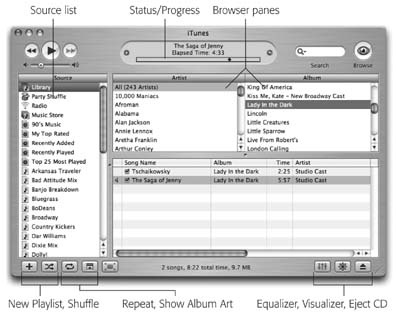iTunes: The Digital Jukebox
iTunes, in your Applications folder, is the ultimate software jukebox (Figure 11-5). It can play music CDs, tune in to Internet radio stations, load up your iPod music player, and play back digital sound files (including the Internet's favorite format, MP3 files) and other popular audio formats. It can also turn selected tracks from your music CDs into MP3 files, so that you can store favorite songs on your hard drive to play back anytime—without having to dig up the original CDs. If your Mac can burn CDs, iTunes lets you record your own custom audio CDs that contain only the good songs. Finally, of course, iTunes is the shop window for Apple's popular online iTunes Music Store ($1 a song).

Figure 11-5. When the Library icon is selected in the Source list, you can click the Browse button (upper-right) to produce a handy, supplementary view of your music database, organized like a Finder column view. It lets you drill down from a performer's name (left column) to an album by that artist (right column) to the individual songs on that album (bottom half, beneath the browser panes).
iTunes can also burn MP3 CDs: music CDs that fit much more than the usual 74 or 80 minutes of music onto a disc (because they store songs in MP3 format instead of AIFF). Not all CD players can play MP3 discs, however, and the sound quality is slightly lower than standard CDs.
The first ...
Get Mac OS X: The Missing Manual, Tiger Edition now with the O’Reilly learning platform.
O’Reilly members experience books, live events, courses curated by job role, and more from O’Reilly and nearly 200 top publishers.

